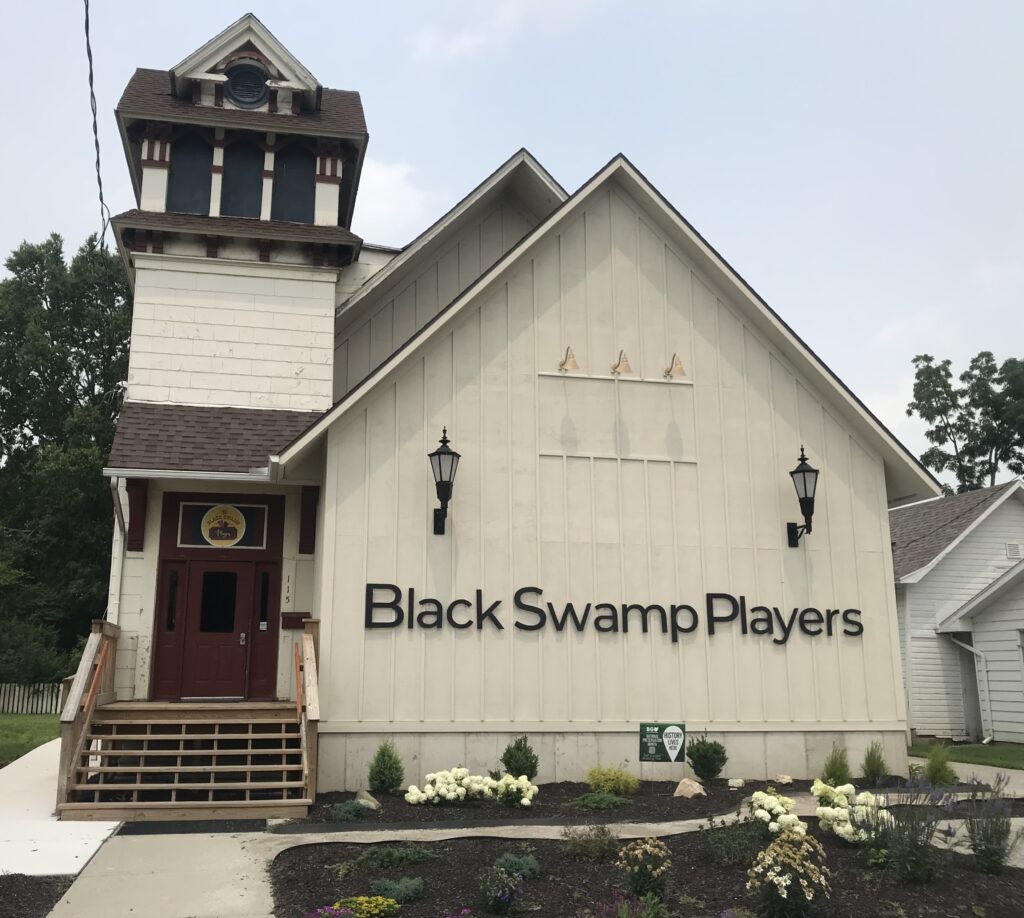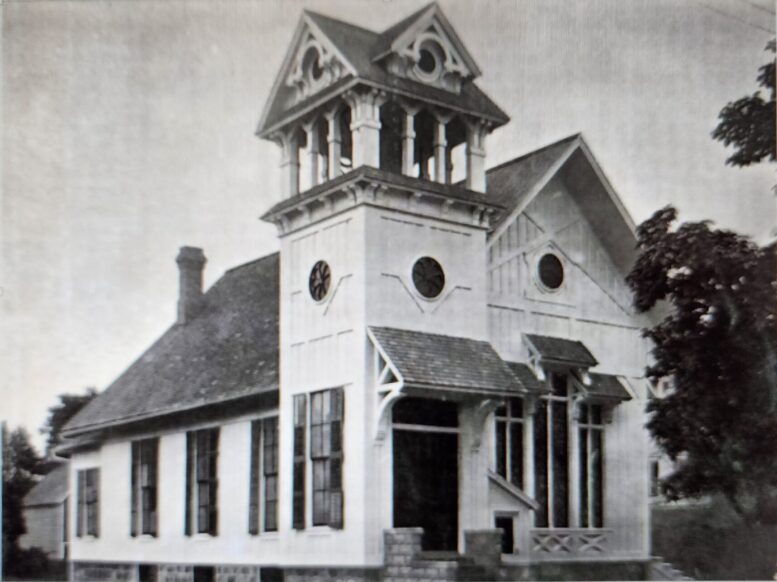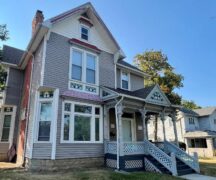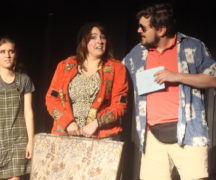(Written by Geoffrey C. Howes, Bowling Green Historic Preservation Commission)
The story of how the former First Baptist Church at 115 E. Oak St. in Bowling Green became the Plan, Do and Talk preschool and then the home of the Black Swamp Players is also a tale of the preservation of one of the oldest standing structures in the city.
The First Baptist Church of Bowling Green was organized Sept. 29, 1878. Articles of incorporation were filed April 15, 1880, and services were first held in Blank’s Hall, which was located at what is now 110-118 North Main Street (currently Red Sky Pizza and Groth & Associates law offices).
The cornerstone of a new church on East Oak Street was laid on July 20, 1880, overseen by Rev. James Adams, pastor from 1878 to 1882. The building was completed in the fall of 1880 at a cost of $3,500 (approx. $105,614 in 2023).
Remarkably, this wooden church escaped the fires of both 1887 and 1888, which claimed so many buildings just a short block or two from Oak Street. Between 1880 and 1969, the church’s interior was redecorated three times. At some point, the heating system was converted from a wood-burning stove to a gas furnace.
A 1968 publication of the First Baptist Church states that the house to the west of the church was built as a parsonage in 1940, but the Wood County Auditor’s website lists the year built as 1920, and the building appears on a 1925 Sanborn Map. The map indicates that there was an underground concrete tunnel connecting the parsonage to the church, and a section of this tunnel (partly above ground) is still visible next to the house at 111 E. Oak St., now owned and rented by Greenbriar Inc.
In January of 1962, when more room was needed for Sunday school classes, the cold-storage locker plant at 107 E. Oak (now the Potter law offices) was purchased as an annex. By 1968, the worship space on Oak Street itself had become so overcrowded that members of the congregation had to sit in the basement on Sunday mornings. And so, in 1969, the First Baptist Church moved to its current location on South Wintergarden Road, under Pastor Bruce N. Stewart. In 1975, the bell that had hung and rung in the belfry of the Oak Street church was placed on the front lawn of the new house of worship, where it can still be seen today.
From 1969 to the early 1970s, the old church was occupied by the Church of Jesus Christ of Latter-Day Saints. In 1974, the Plan Do and Talk preschool moved in, starting as a daycare center. Ron and Sue Neufeld purchased it in 1981 and expanded its programs to include a licensed preschool, a chartered K-3 primary school, before- and after-school programs, and summer camps for children from 2 1⁄2 to 12 years old. Plan, Do and Talk closed its doors in 2016.

The former church, then former preschool, stood empty until the Black Swamp Players (BSP) turned it into their first permanent playhouse in 2019. After 50 years of providing dramatic entertainment to the community at a variety of venues, the troupe had found out it could not continue putting on shows at its latest location, the First United Methodist Church on East Wooster. The Black Swamp Players board voted to suspend operations.
This announcement rekindled the interest of the public, and theater aficionados rallied to save the institution and find it a new location. Heath Diehl replaced Lane Hakel as president. In 2019 the Players signed an agreement to lease the old church building for two years with an option to buy. At the time, Hakel noted the advantage of being close to downtown, opening up the possibility of “dinner and a show.” Having been in recent use, the building was in good condition and already had an occupancy permit. It did, of course, need a “deep cleaning.”
Hakel noted that when he worked on a show at the Croswell Opera House in Adrian, Michigan, he saw an economic report that showed the theater had given the city a “gigantic” boost. He also mentioned that both the Fort Findlay Players and the Toledo Rep are housed in former churches.
Such a project requires funding, of course. Seed money came through gifts from Tom and Dianne Klein and Milt and Lee Hakel. The Bowling Green Community Foundation contributed funds in 2019 for the one-time purchase of theater seating, recognizing that the BSP “has long been a strong advocate for promoting the arts in BG and contributing to the social, emotional, and cultural health of our community and people of all ages, children through adult.” The old church also has a commercial kitchen, and the Players planned to rent the space to other groups.
Auditions and rehearsals were held on Oak Street in 2019, and on Monday Feb. 3, 2020, the Black Swamp Players hosted a performance there as part of a planned “First Monday” series to raise public interest and generate revenue. Tim Tegge and the Black Swamp Boys played two sets and cast members Deb Weiser, Hali Malecki, Sally Stemen, Rose Drain, and Lane Hakel performed scenes, including some from “Lily, the Felon’s Daughter,” the first play the BSP ever put on, in 1968.
The plan was to continue “First Mondays,” but then the Covid-19 pandemic hit, and the newly reborn BSP had to cancel productions and fundraisers. There were some online and socially distanced performances, and despite the public health crisis, the Players launched a capital campaign in the summer of 2020.
They raised $70,000 and received $200,000 in state capital funding and an anonymous matching gift of $100,000. The Bowling Green Chamber of Commerce also awarded the BSP its Investor Grant for the first quarter of 2021, to support an internship for web development. As of Jan. 11, 2021, the Black Swamp Players owned the old church. The cost was $175,000, but they estimated they still had to do about $500,000 worth of renovation.
In April 2021, the group was finally able to stage its first live performances in over a year. Since then, renovation has proceeded, including an ADA-compliant entry ramp and restrooms that make the building totally accessible. This year, the BG Zoning Board of Appeals granted a variance to allow an extra-large advertising wall sign on the front of the building, needed for promoting a whole season of productions.
The 2023-2024 season is the Black Swamp Players’ 55th, and their third season in the building that has served Bowling Green since 1880. While making good theater was their main purpose, the troupe has also set a great example of how to bring a community together to contribute to historic preservation.
Would you like to nominate a historic building or site for recognition? You can do this through the City website at – https://www.bgohio.org/FormCenter/Planning-13/Historic-BuildingSite-Nomination-Form-83
You can learn more about the Historic Preservation Commission by attending their meetings (the fourth Tuesday of each month at 4 p.m.) or by visiting their webpage at – https://www.bgohio.org/436/Historic-Preservation-Commission





